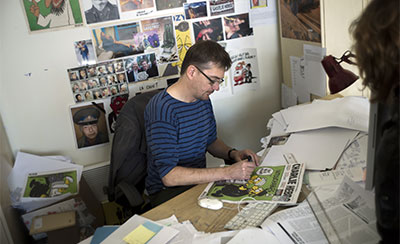Connection impossible! The Charlie Hebdo website was not accessible on Wednesday afternoon after the French satirical magazine proclaimed that it had published fresh cartoons of the Prophet Muhammad. Stéphane Charbonnier, its editor-in-chief, confirmed that the site had been attacked by hackers.
This might be a minor event in the national and international row that the impertinent weekly has triggered with its decision to defiantly hoist the banner of freedom of expression while the world is still being rocked by protests over the film “The Innocence of Muslims.” Violence linked to the film has killed at least 28 people in seven countries over the past week, including the U.S. ambassador to Libya, news reports say.
To the chagrin of its detractors, Charlie Hebdo is a recidivist. In 2006 the weekly unabashedly reprinted cartoons mocking the Prophet in the Danish Jyllands-Posten, and in 2011 it published a special “Sharia edition” which lambasted the rise of Islamist parties in Tunisia and Egypt.
Condemnations have been immediate. “This is a new act of Islamophobia aimed at deliberately offending the feelings of Muslims,” said the French Council of the Muslim Faith, calling “on all French Muslims not to cede to provocation.” The president of the major Jewish organization known by its acronym CRIF, Richard Prasquier, also expressed his disapproval at a “form of irresponsible panache.”
In Cairo, Sheikh Ahmed al-Tayyeb, the dean of the highly influential Al-Azhar University, denounced “an incitement to hatred” and he was joined in his outrage by the Vatican daily Osservatore Romano, which accused Charlie Hebdo of “throwing oil on the fire.”
Fearing acts of violence, the French authorities promptly sent a police squad to protect the premises of the magazine. Last year the building hosting Charlie Hebdo was firebombed after the publication of its Sharia issue. They also immediately put out an embassy alert and decided to close French representations (embassies, consulates, cultural centers and schools) in some 20 countries on Friday, the day of Muslim prayer. In Tunisia the closure has already been made effective from Wednesday to Monday.
Charlie Hebdo‘s caricatures are voluntarily shocking. According to the liberal daily Libération, one of them shows a naked Prophet in a parody of Jean-Luc Godard’s film “Le Mépris” where actor Michel Piccoli admires the curves of Brigitte Bardot. “I don’t ask fundamentalist Muslims to read Charlie Hebdo,” said the editor-in-chief. “Likewise I would never enter a mosque to listen to speeches which run counter to my beliefs.”
Although the fiercely anti-religious weekly is well-known for attacks on dogmas and mandarins, the magazine’s defiant and risky initiative has started a tense debate in France–a strongly secular country which also has the EU’s largest Muslim community.
While French Prime Minister Jean-Marc Ayrault tried to strike a balance between the defense of freedom of expression and his concern for trouble, other members of the French establishment came to the direct defense of the magazine. Interior Minister Manuel Valls declared that freedom of expression, and especially the right of caricature, is “a fundamental right defined by law” and promised the utmost severity against demonstrators that would “trouble the public order.” Former conservative Prime Minister François Fillon also expressed his full support in the name of freedom of expression.
The reactions to Charlie Hebdo are guided by a mix of motives. Some express the deep conviction that in a secular country like France, the faithful of all religions should accept irony and even blasphemy. Others however, especially on the far-right, are framing the controversy as a battle between civilizations and using it to demonstrate that unreformed Islam is incompatible with the French Republic.
The usually very temperate daily Le Monde also backed Charlie Hebdo. While characterizing the caricatures as “tasteless” and underlining the risks of publishing them in such a volatile moment, its editorial strongly stated that “in a secular Republic freedom of expression trumps all other norms, especially religious norms. Religions are respectable forms of thought and belief but they can be freely analyzed, criticized, and even ridiculed.”
[Reporting from Brussels]
